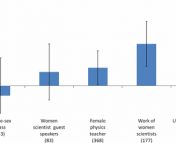Note: This astrobite has information compiled from several different sources – scroll down to the bottom of this article for a list of references and more!
Academia isn’t the only answer!
There’s that nail-biting, hair-raising, heart-racing, spine-shivering, truly frightening question that all students in astronomy face at some point during their journey:
What am I going to do after graduation?!?
The ‘traditional’ answer is quite formulaic:
- Get a PhD in astronomy
- Serve as a postdoctoral researcher for a few years
- Work as an assistant professor at a research-based college or university
- Eventually gain tenure or some similar permanent faculty position as a professor

A worthy goal. Picture credit to money.cnn.com/pf/best-jobs/.
But these days, this ‘traditional’ route is harder – or at the very least, more time-consuming – to achieve. The pipeline from PhD graduate to permanent professor takes a very long time; those years you spend as a postdoc and/or assistant professor can add up to a decade or more. Throughout those years, you face the anxiety, limitations, and high competition that come from a saturated job market in academia.
How saturated is saturated? Back in 2005, the American Astronomical Society (AAS) published an extensive guide on “Careers in Astronomy“. Within their guide, the AAS stated that, in a typical year, their Job Register advertised some 200 to 300 jobs. Around 150-200 of those jobs were for postdoctoral positions. Now consider how, in that same typical year, about 240 PhDs in astronomy/astrophysics were awarded on average. That’s a high PhD-to-postdoc ratio! And the situation hasn’t improved with time. (Want to hear more about the state and struggles of the job market in academia? Scroll down to the Resources section at the bottom of this post!)
If you truly want to become a professional astronomer, then by all means, march forward and tunnel through the competition with your head held high! But you should also know that this traditional pathway is not the only path that exists! There are a number of jobs outside of academia where you can put your astronomy undergrad degree and/or PhD to good use. In this ‘beyond’ post, we take some time to first discuss some of the skills you can hone during your journey as an astronomy student (astro student for short), and then talk about various non-academia jobs that would find those skills pretty valuable.
The marketable skills that an astronomy degree can give you.
So, what swell skills can you get as an astro student?
To answer that question, let’s go over some of the things you do as an astro student, and then flip through the widely-applicable skills those activities entail:
Taking classes:
Consider the classes you take, for example. A lot of the knowledge-based astro courses out there, such as classes on interstellar chemistry or stellar atmospheres, seem to delve more deeply into a particular subject. But these classes are actually quite interdisciplinary, and thus connect you to other fields, like chemistry and biology. And technical astro courses, like classes that explore noise analysis, observation techniques, and instrumentation in astronomy, provide you with knowledge in general practices that are most certainly valuable outside of academia.
You can also explicitly take classes in other fields you’re considering working in someday. These classes, like those in computer science, mathematics, physics, statistics, writing, and so on, can broaden your background and skill sets. Undergrad programs often offer double majors or minors in these subjects, which make great additions to any main degree. And some grad school programs even offer ‘PhD Minors’ or ‘Secondary Fields’ (see the Resources section below for examples!), so that you can supplement a PhD with another subject you’re interested in – definitely a useful addition beyond academia.
Doing and communicating research:
The simple fact that you do research as an astro student speaks to a plethora of skills in your toolset. As an astro student, you learn the entirety of the scientific process, from defining a research problem, to testing your hypothesis, to analyzing your data, to making significant conclusions. This ability to not only identify and understand a problem, but also to think of and carry out ways to solve said problem, is an invaluable ability beyond academia.
Even better, as an astro student you learn to tell others about your research in clear and concise ways. You tend to do a lot of writing (proposals, papers, reports…) and talking (presentations, research talks, defenses…) during your astronomy track. With practice, you can learn to strip out the jargon of your research and cater your words so that they reach whatever audience you’re currently facing – be it a group of advisers for your senior/PhD thesis defense, or a group of elementary students for a public outreach event. In particular, public outreach is a wonderful – and rewarding – way to develop this skill. As a student, you can seek out these activities at local schools, planetariums, online classrooms, and the like, and really practice your communication skills in interactive programs directed towards younger students. After all, the ability to communicate your research effectively, regardless of the audience, is priceless!
Being a teaching assistant (TA, TF…):
As an astro TA, you’re likely to do some combination of the following: hold office hours, lead review sessions, grade, and even teach sessions and lectures. By doing so, you learn a very valuable skill: the ability to teach. As any student who has suffered through a poorly-taught class will know, teaching is more than just writing some stuff on the board, showing some PowerPoint slides, and giving homework. Teaching well means presenting material in such a way that it is engaging, challenging, and – perhaps most importantly – comprehensible. As an astro student (particularly on the grad level), you can practice this crucial skill.
These are just a few (there are definitely more!) of the tasks you undergo as a student that you can use to grow and enhance some widely-applicable skills.
Where you can put those marketable skills to use.
Alright! We’ve talked about the awesome skills that you can develop as an astro student. Now, where can you put those skills to use beyond academia?
Short answer: a LOT of places.
Let’s go through a handful of them (in alphabetical order – and keep in mind that this is by no means an exhaustive list!).
Computer and Data Science:
As an astro student, you can naturally become an expert in a modern, universally-useful computer language(s), and really learn your way around computer terminals. After graduating, you can use your programming skills as a computer scientist. Businesses and companies seek out computer scientists, depending on their expertise, to work for them as computer programmers, software developers, and software engineers.
You can also take the skills you pick up doing statistical and data analysis in astronomy, turn around, and apply them to non-astronomy data sets for companies as well. Companies in finance, business, and the medical fields, just to name a few, hire data analysts to peruse their massive amounts of data and help them find trends, patterns, and abnormalities.
Mechanics:
If you’re more interested in the ‘how-things-work’ side of astronomy, then you can work a more technical job. For example, national observatories and technical firms look for people with expertise in projects of instrumentation or operation. They hire both operators and specialists to handle their telescopes and equipment, to list just a couple of examples. And space-related companies hire people to manage and consult in their own endeavors as well.
Public Outreach:
If you enjoy communicating science to various audiences, then you can work a job dedicated to public outreach. For example, planetariums, science centers, and museums hire astronomers with great communication skills to work as their guides, planners, and lecturers. These scientists serve as a link between the general public and the jargon-steeped professional astronomy community, and convey their love of astronomy (and science in general!) to everyone they reach, from student to senior.
Research:
If you want to keep doing research, you can definitely do research outside of academia. For instance, non-academic research happens at a variety of national and/or government-supported institutions, laboratories, and observatories. These organizations tend to have specific research interests and goals in mind, and they hire researchers to help them further their objectives.
Organizations in business and private industry carry out research as well. Companies related to aerospace, aeronautics, and energy, for example, employ researchers to keep them up-to-date on the latest, most cutting-edge research, and to help them stay ahead of competition.
Teaching:
You don’t have to be a tenured professor to teach! If you enjoy teaching students about astronomy, or more broadly science in general, then you can certainly do so on other levels. Middle and high schools, for example, hire people that are passionate about their science to teach STEM subjects (like physics) to their students. Colleges, institutions, and universities that aren’t focused on research need teachers, too, and can hire astronomers into such important roles.
Writing:
If you enjoy translating astronomy jargon and obscure terms into language that the more general public can understand, then consider becoming a science writer. From science journalism to technical reports, there are a number of jobs that hire scientists to write about the science they love doing. And companies that deal with educational works, such as those that write, edit, and publish textbooks, also look for scientists to help them decide what the next generation of astronomers will study and learn.
Again, this is not an exhaustive list!
Looking forward to the future.
As you can see, the overarching question – what will I do after I graduate? – has more than one complex answer! If professional astronomy is not for you, then don’t worry; it’s far from the end of the world (or universe). Just grow, develop, and hone those valuable skills during your time in school, and you’ll be ready to take the non-academia job market by storm!
Check out these cool resources!
Want to read more about the difficulties in recent years for those travelling the traditional pathway? Feel free to look at:
- This blog post on the astronomy job market.
- This article that speaks to the market’s high competition.
- This astrobite that discusses the stress and sacrifices aspiring professional astronomers can face.
- This article and this other article on the general fate of PhDs after graduation.
Never heard of a PhD Secondary Field or PhD Minor? They do exist (although, unfortunately, they don’t exist everywhere). Check out some examples of where they’re offered below:
- For the University of Wisconsin.
- For Harvard University.
- For Ohio State University.
Next, these are some posts that discuss what graduate students in astronomy do:
- Here’s the first-hand account of a Caltech student on what it’s like to be an astrophysics PhD student (and there are links to more first-hand accounts at the bottom of the article).
- Here’s a link to the University of Texas at Austin’s general description of their astronomy graduate student program (including, for example, the classes students can take).
And here are some websites that speak to (1) the skills you can build as an astro student and/or (2) jobs where you can utilize these skills:
- University of Michigan’s Career Center on going “From Study to Skills” in astronomy.
- The National Careers Service on some of the skills and tasks of an astronomer.
- Astronomy Notes on astronomy, and astronomy-related, careers, as well as other helpful links on the same subject.
- The University of Cambridge on the “Transferable Skills” astronomers develop (as well as why they’re important).
- A website (discussed in this previous astrobite) that offers career descriptions and testimonies of astronomers working outside of astronomy.
- The AAS on careers for astronomers both in and out of professional astronomy.
Happy job-researching!





It is of interest to note that the United States is not the only option for academic research positions. There are numerous astronomy academic positions available at universities and other academic institutes in the United Kingdom. Furthermore, as UK PhDs tend to emphasize the research component more than doctorates earned in the United States, it may be easier to obtain academic research positions in the UK, if your PhD was obtained from a UK university.
Also, don’t wait until defense time to start thinking about this stuff. Prepare early, including building your professional network. Beyond the traditional (manual) meet-and-greet-and-keep-in-touch method, sites like LinkedIn provide resources for job-seekers regardless of level or field of study; putting together a profile and adding your fellow grad students, professors, and maybe even some students you’ve TA’d doesn’t take much time and might pay off in the future.
(Full disclosure: I’m a former astrophysicist who now works for LinkedIn, but I was a member for nearly a decade before I joined as an employee. If nothing else, being a member is an easy way to contact former colleagues whose email has changed since you worked with them. 🙂 )